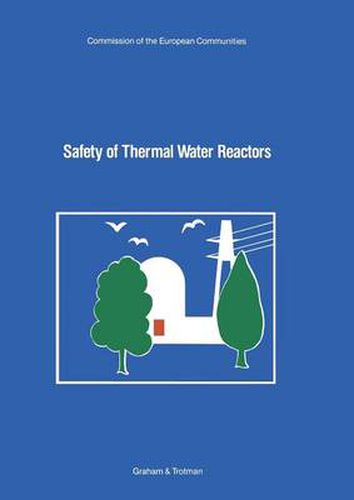Readings Newsletter
Become a Readings Member to make your shopping experience even easier.
Sign in or sign up for free!
You’re not far away from qualifying for FREE standard shipping within Australia
You’ve qualified for FREE standard shipping within Australia
The cart is loading…






This title is printed to order. This book may have been self-published. If so, we cannot guarantee the quality of the content. In the main most books will have gone through the editing process however some may not. We therefore suggest that you be aware of this before ordering this book. If in doubt check either the author or publisher’s details as we are unable to accept any returns unless they are faulty. Please contact us if you have any questions.
The European Community’s Indirect Action Research Programme on the Safety of Thermal Water Reactors had as main obj ectives to execute useful fundamental research, complementary and confirmatory to on-going work in national programmes, and to improve collaboration and exchange of inform ation between laboratories in the Member States. The Seminar was aimed to report on work performed during the last five years and to identify useful further research areas with a tentative assessment of the state of the art for future work in certain issues of LWR-safety. The results obtained in 33 research projects executed in different national laboratories of the European Community were presented, evaluated and discussed, together with a number of invited papers on topics related to the research programme. Topics covered mainly within 3 distinct research areas or sub-programmes: Research Area A: The loss of coolant accident (LOCA) and the func tioning and performance of the emergency core cooling system (ECCS). Fundamental work on thermalhydraulics and heat transfer during refill and reflood of an uncovered core after a LOCA. Research Area B: The protection of nuclear power plants against external gas cloud explosions. Study of the impact on plant structure and systems of external explosions of dense combustible gas clouds due to accidental releases of hydro carbons in the vicinity of the plant. Research Area C: The release and distribution of radioactive fission products in the atmosphere following a reactor accident.
$9.00 standard shipping within Australia
FREE standard shipping within Australia for orders over $100.00
Express & International shipping calculated at checkout
This title is printed to order. This book may have been self-published. If so, we cannot guarantee the quality of the content. In the main most books will have gone through the editing process however some may not. We therefore suggest that you be aware of this before ordering this book. If in doubt check either the author or publisher’s details as we are unable to accept any returns unless they are faulty. Please contact us if you have any questions.
The European Community’s Indirect Action Research Programme on the Safety of Thermal Water Reactors had as main obj ectives to execute useful fundamental research, complementary and confirmatory to on-going work in national programmes, and to improve collaboration and exchange of inform ation between laboratories in the Member States. The Seminar was aimed to report on work performed during the last five years and to identify useful further research areas with a tentative assessment of the state of the art for future work in certain issues of LWR-safety. The results obtained in 33 research projects executed in different national laboratories of the European Community were presented, evaluated and discussed, together with a number of invited papers on topics related to the research programme. Topics covered mainly within 3 distinct research areas or sub-programmes: Research Area A: The loss of coolant accident (LOCA) and the func tioning and performance of the emergency core cooling system (ECCS). Fundamental work on thermalhydraulics and heat transfer during refill and reflood of an uncovered core after a LOCA. Research Area B: The protection of nuclear power plants against external gas cloud explosions. Study of the impact on plant structure and systems of external explosions of dense combustible gas clouds due to accidental releases of hydro carbons in the vicinity of the plant. Research Area C: The release and distribution of radioactive fission products in the atmosphere following a reactor accident.